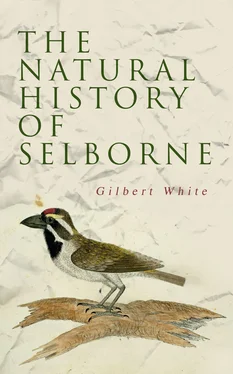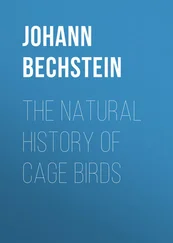It would not be at all strange if your bat, which you have procured, should prove a new one, since five species have been found in a neighbouring kingdom. The great sort that I mentioned is certainly a nondescript; I saw but one this summer, and that I had no opportunity of taking.
Your account of the Indian grass was entertaining. I am no angler myself; but inquiring of those that are, what they supposed that part of their tackle to be made of?—they replied, “Of the intestines of a silkworm.”
Though I must not pretend to great skill in entomology, yet I cannot say that I am ignorant of that kind of knowledge; I may now and then perhaps be able to furnish you with a little information.
The vast rains ceased with us much about the same time as with you, and since we have had delicate weather. Mr. Barker, who has measured the rain for more than thirty years, says, in a late letter, that more has fallen this year than in any he ever attended to; though from July, 1763, to January, 1764, more fell than in any seven months of this year.
Table of Contents
Selborne, Feb. 28th , 1769.
Dear Sir—It is not improbable that the Guernsey lizard and our green lizards may be specifically the same; all that I know is, that, when some years ago many Guernsey lizards were turned loose in Pembroke College garden, in the University of Oxford, they lived a great while, and seemed to enjoy themselves very well, but never bred. Whether this circumstance will prove anything either way I shall not pretend to say.
I return you thanks for your account of Cressi Hall; but recollect, not without regret, that in June, 1746, I was visiting for a week together at Spalding, without ever being told that such a curiosity was just at hand. Pray send me word in your next what sort of tree it is that contains such a quantity of herons’ nests, and whether the heronry consists of a whole grove of wood, or only of a few trees.
It gave me satisfaction to find we accorded so well about the caprimulgus ; all I contended for was to prove that it often chatters sitting as well as flying; and therefore the noise was voluntary, and from organic impulse, and not from the resistance of the air against the hollow of its mouth and throat.
If ever I saw anything like actual migration, it was last Michaelmas Day. I was travelling, and out early in the morning; at first there was a vast fog, but, by the time that I was got seven or eight miles from home towards the coast, the sun broke out into a delicate warm day. We were then on a large heath or common, and I could discern, as the mist began to break away, great numbers of swallows ( hirundines rusticæ ) clustering on the stunted shrubs and bushes, as if they had roosted there all night. As soon as the air became clear and pleasant they were all on the wing at once; and, by a placid and easy flight, proceeded on southward towards the sea; after this I did not see any more flocks, only now and then a straggler.
I cannot agree with those persons that assert that the swallow kind disappear some and some gradually, as they come, for the bulk of them seem to withdraw at once; only some stragglers stay behind a long while, and do never, there is the greatest reason to believe, leave this island. Swallows seem to lay themselves up, and to come forth in a warm day, as bats do continually of a warm evening, after they have disappeared for weeks. For a very respectable gentleman assured me that, as he was walking with some friends under Merton Wall on a remarkably hot noon, either in the last week in December or the first week in January, he espied three or four swallows huddled together on the moulding of one of the windows of that college. I have frequently remarked that swallows are seen later at Oxford than elsewhere; is it owing to the vast massy buildings of that place, to the many waters round it, or to what else?
When I used to rise in the morning last autumn, and see the swallows and martins clustering on the chimneys and thatch of the neighbouring cottages, I could not help being touched with a secret delight, mixed with some degree of mortification; with delight, to observe with how much ardour and punctuality those poor little birds obeyed the strong impulse towards migration, or hiding, imprinted on their minds by their great Creator; and with some degree of mortification when I reflected that, after all our pains and inquiries, we are yet not quite certain to what regions they do migrate, and are still farther embarrassed to find that some do not actually migrate at all.
These reflections made so strong an impression on my imagination, that they became productive of a composition that may perhaps amuse you for a quarter of an hour when next I have the honour of writing to you.
Конец ознакомительного фрагмента.
Текст предоставлен ООО «ЛитРес».
Прочитайте эту книгу целиком, купив полную легальную версию на ЛитРес.
Безопасно оплатить книгу можно банковской картой Visa, MasterCard, Maestro, со счета мобильного телефона, с платежного терминала, в салоне МТС или Связной, через PayPal, WebMoney, Яндекс.Деньги, QIWI Кошелек, бонусными картами или другим удобным Вам способом.












